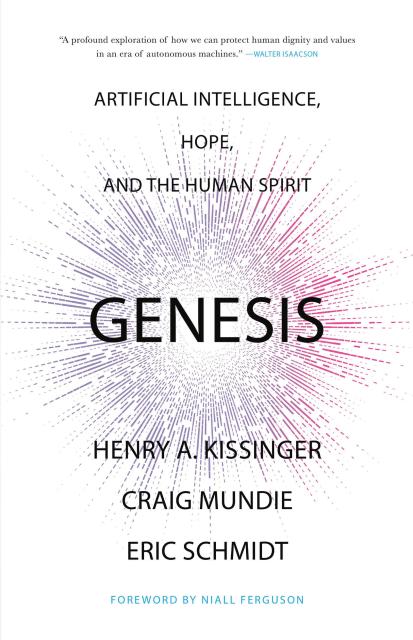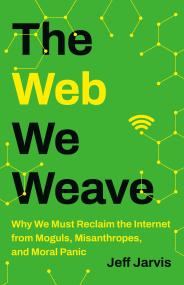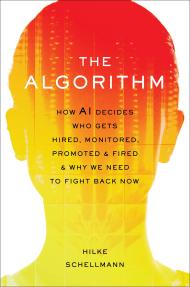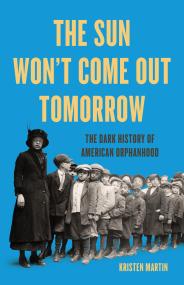Promotion
Use code CAP24 for 15% off sitewide + free shipping over $35
Genesis
Artificial Intelligence, Hope, and the Human Spirit
Contributors
By Eric Schmidt
By Craig Mundie
Foreword by Niall Ferguson
Formats and Prices
Price
$30.00Price
$39.00 CADFormat
Format:
- Hardcover $30.00 $39.00 CAD
- ebook $16.99 $21.99 CAD
- Audiobook Download (Unabridged) $24.99
This item is a preorder. Your payment method will be charged immediately, and the product is expected to ship on or around November 19, 2024. This date is subject to change due to shipping delays beyond our control.
Also available from:
NEW YORK TIMES BESTSELLER | USA TODAY BESTSELLER | LOS ANGELES TIMES BESTSELLER | J.P. MORGAN NEXTLIST SELECTION
In his final book, the late Henry Kissinger joins forces with two leading technologists to mount “a profound exploration” (Walter Isaacson) of the epochal challenges and opportunities presented by the revolution in Artificial Intelligence: a breakthrough that dramatically empowers people in all walks of life while also raising urgent questions about the future of humanity.
As it absorbs data, gains agency, and intermediates between humans and reality, AI (Artificial Intelligence) will help us to address enormous crises, from climate change to geopolitical conflicts to income inequality. It might well solve some of the greatest mysteries of our universe and elevate the human spirit to unimaginable heights. But it will also pose challenges on a scale and of an intensity that we have never seen—usurping our power of independent judgment and action, testing our relationship with the divine, and perhaps even spurring a new phase in human evolution.
The last book of elder statesman Henry Kissinger, written with technologists Craig Mundie and Eric Schmidt, Genesis charts a course between blind faith and unjustified fear as it outlines an effective strategy for navigating the age of AI.
-
"In Genesis, the Kissingerian imprint—that elegant mix of idealism and realism—is evident everywhere . . . Genesis is as much a philosophy book—drawing on all that is best in the Western tradition—as it is a book that grapples with a techno-scientific phenomenon. It raises tough, often disconcerting, sometimes harrowing questions . . . wise and deeply sane."Wall Street Journal
-
“AI may be one of the greatest technological revolutions ever, and the biggest question is how humans will adapt. This important book offers one of the first real looks at the future now in front of us—a future of almost limitless possibility, along with very complex new challenges.”Sam Altman
-
“A timely exploration of the relationship between artificial intelligence and knowledge, power, and politics, this book pushes us to think hard about the risk and potential AI holds for humanity.”Bill Gates
-
“In the coming Age of Artificial Intelligence, what will be the role of humans? In the final years of his life, Henry Kissinger immersed himself in studying AI, and he coauthored this book with technologists Eric Schmidt and Craig Mundie. It is a profound exploration of how we can protect human dignity and values in an era of autonomous machines.”Walter Isaacson
-
“Kissinger, Mundie and Schmidt provide the deepest reflections we yet have on the opportunities and challenges posed by the looming AI-shaped global system. Readers of their book will learn something profoundly important. Before we can even think about new policies regarding AI, we will need to develop new conceptions of human reason and humanity itself. This book was Henry Kissinger’s final work. It may well prove his most prophetic and important. It is profoundly important reading.”Larry Summers
-
“The next great technological revolution — in artificial intelligence — is already happening. While much of the conversation is about what AI can do and where AI will go, this book brilliantly reframes the discussion. How will human beings relate to AI? How does this thrilling, terrifying new scientific explosion change our conception of what it means to be human. You would expect a profound book given the three authors involved — and you will get it.”Fareed Zakaria
-
“The authors of Genesis raise profound questions that are best answered by placing intelligent tools and technologies in the hands of people, empowering them with real agency to be more confident, more capable, and more in control.”Satya Nadella
-
“A must read for anyone trying to think seriously about the challenges posed by AI. Genesis captures what we know—and most importantly don’t know—about the dangers posed by the unconstrained advance of AI. Drawing on lessons learned in the nuclear age, Kissinger and his colleagues illuminate the murky path ahead.”Graham Allison
-
“Kissinger, Schmidt, and Mundie have crafted a roadmap for navigating our near-future in which unimaginably powerful and ubiquitous AI systems have become autonomous. Their insights into the practical and philosophical implications of humanity's first encounter with a superior intelligence are sobering and inspiring, challenging us to rethink our relationship with technology and our place in the universe. Genesis is vital reading for anyone seeking to understand how AI will reshape our world and what it takes to remain human in the age of intelligent machines.”Ian Bremmer
-
“What does AI mean for discovery? For truth? For security, prosperity and politics? In answering these questions, these three extraordinary thinkers are (characteristically) unafraid to tackle the biggest themes and most profound questions around the dominant technology of our times. Epic in scope, bracing in clarity and always rooted in deep experience, this is an essential read.”Mustafa Suleyman
-
“Genesis is thought-provoking in the best way — a much needed exploration of AI’s implications for humanity’s progress and what makes us human. It is also a roadmap for how we can harness AI’s possibilities, address its challenges, and ultimately co-exist with intelligent machines in the age of AI.”James Manyika
-
“Artificial intelligence boggles the mind, and we struggle to comprehend its promises and perils. In his final book, it is fitting that the master of Grand Strategy, Henry Kissinger, with his superb coauthors Eric Schmidt and Craig Mundie, have focused on this topic. Genesis is the book our world needs to read today.”Arthur C. Brooks
-
“As we try to navigate a responsible path into the future of AI, this book establishes a hopeful framework for how we might coexist while maintaining what it means to be human. In his final work, Henry Kissinger, one of the most consequential thinkers of our time, partnered with Eric Schmidt and Craig Mundie, to help guide us into this unprecedented frontier, so that we might harmonize its growth and importance with the wisdom needed to ensure - that this time - technology will be used for the good of humankind. It is a must read for the decision makers – which is all of us.”Condoleezza Rice
-
“A posthumous postscript on a hair-raising topic… From beyond the grave, Kissinger is pointing in the right direction.”The Economist
- On Sale
- Nov 19, 2024
- Page Count
- 288 pages
- Publisher
- Little, Brown and Company
- ISBN-13
- 9780316581295













